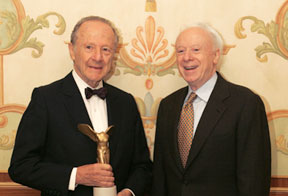 |

For further MBL News and Media Information, contact the MBL Communications Office at (508) 289-7423 or e-mail us at
.
September 27, 2004
|
 |
|
Dr. Matthew Meselson (L) with
Lasker Jury Chairman Joseph Goldstein
|
MBL Scientist Matthew Meselson Receives Prestigious Lasker Award for Special Achievement in Medical Science
WOODS HOLE, MA - The Albert & Mary Lasker Foundation of New York, New York has awarded the 2004 Lasker Award for Special Achievement in Medical Science to Marine Biological Laboratory (MBL) Adjunct Scientist and Corporation Member Dr. Matthew Meselson. The Award was announced on Sunday, September 26 and was presented at a luncheon ceremony on Friday, October 1 in New York City.
The Lasker Awards are the nation’s most distinguished honor for outstanding contributions to basic and clinical medical research. Often called “America’s Nobels,” the Lasker Award has been presented to 68 scientists who subsequently went on to receive the Nobel Prize, including 15 in the last 10 years.
Meselson, a Professor at Harvard University, is being honored “for a lifetime career that combines penetrating discovery in molecular biology with creative leadership in public policy aimed at eliminating chemical and biological weapons,” according to a statement released by the Lasker Foundation.
A stunning achievement of Meselson’s early career had its beginnings at the MBL. In the summer of 1954, while working alongside James Watson as a teaching assistant in the Laboratory’s Physiology course, Meselson met Franklin Stahl, a post-doctoral fellow who was a student in the course. That summer, the two young scientists began discussing possible experiments that would prove or disprove Watson and Francis Crick's model of semi-conservative DNA replication. In the years that followed, Meselson and Stahl carried out their ideas in what is now known in the scientific world as the Meselson-Stahl experiment. Their results verified, for the first time, that the predictions of Watson and Crick were correct.
In a statement released by the Lasker Foundation. Dr. Joseph L. Goldstein, Chairman of the international jury of researchers that selects Award recipients noted,
“The Special Achievement Award honors a researcher who has made extraordinary contributions to both science and public policy. In the early days of molecular biology, Matthew Meselson laid the biochemical groundwork for several key areas: DNA replication, DNA repair, DNA recombination, and DNA restriction. He is revered by his scientific colleagues for carrying out the Meselson-Stahl experiment, which pointed to the correctness of the prediction of the Watson and Crick model for the replication of DNA. This experiment has remained a classic in molecular biology for more than four decades, and has been referred to as “the most beautiful experiment in biology.” Not content to be an armchair academic, Meselson also has been tireless and passionate in leading successful efforts to persuade the United States government to abandon its biological and chemical weapons programs. He also has been highly influential in helping solve puzzling issues of strategic military importance, such as “yellow rain” and a suspicious outbreak of lethal anthrax in the Soviet Union.”
More than 50 years after his first summer in Woods Hole, the MBL continues to play an important role in Meselson’s research. In 2001 Meselson established a satellite laboratory in the MBL’s Josephine Bay Paul Center for Comparative Molecular Biology and Evolution where he and his colleagues are trying to unravel the mystery behind one of the most perplexing questions in biology: What drives early extinction of asexual organisms, and why it can be averted by sexual reproduction?
While almost all multicellular organisms reproduce sexually, this form of reproduction is much less efficient than asexual reproduction whereby females effectively make clones of themselves. Although asexual organisms often enjoy short-term success against their sexual ancestors, they are rarely found as higher-order taxa, implying that they cannot survive in evolutionary time.
Mesleson and his team study the bdelloid rotifer, a microscopic animal found throughout the world. Bdelloids appear to have given up sex 50 million years ago, yet the organism has evolved into more than 350 described species. By comparing the genomes of bdelloids with their sexual relatives, Meselson and his colleagues hope to uncover what has allowed the animals to evolve successfully without sex. The resolution of this question is likely to have far-reaching impact on the current understanding of basic biological and evolutionary processes.
“We love the fact that Matt’s at the MBL,” says Mitchell Sogin, Director of the Josephine Bay Paul Center. “He brings a presence here, an intellectual excitement. Matt came up during a golden era of molecular biology. His early contributions to the literature are textbook famous. Matt recreates the spirit of that era and it’s infectious, for his students and for the rest of us in the Center. We look forward to Matt spending more time at the MBL in conjunction with his growing interests in molecular processes that drive evolutionary change.”
The Lasker Awards, first presented in 1946, are administered by the Albert & Mary Lasker Foundation. The late Mary Lasker is widely recognized for her singular contribution to the growth of the National Institutes of Health and her unflagging commitment to government funding of medical research in the hope of curing devastating diseases. Lasker Award recipients receive an honorarium, a citation highlighting their achievements, and an inscribed statuette of the Winged Victory of Samothrace, the Albert and Mary Lasker Foundation’s traditional symbol representing humanity’s victory over disability, disease, and death.
The list of the 2004 Lasker Award recipients with their current professional and institutional affiliations are available at www.laskerfoundation.org.
The Marine Biological Laboratory is an independent scientific institution, founded in 1888, dedicated to improving the human condition through basic research and education in biology, biomedicine, and environmental science. MBL hosts research programs in cell and developmental biology, ecosystems studies, molecular biology and evolution, neurobiology, behavior, global infectious diseases and sensory physiology. Its intensive graduate-level educational program is renowned throughout the life sciences. The MBL is the oldest private marine laboratory in the western hemisphere.
|